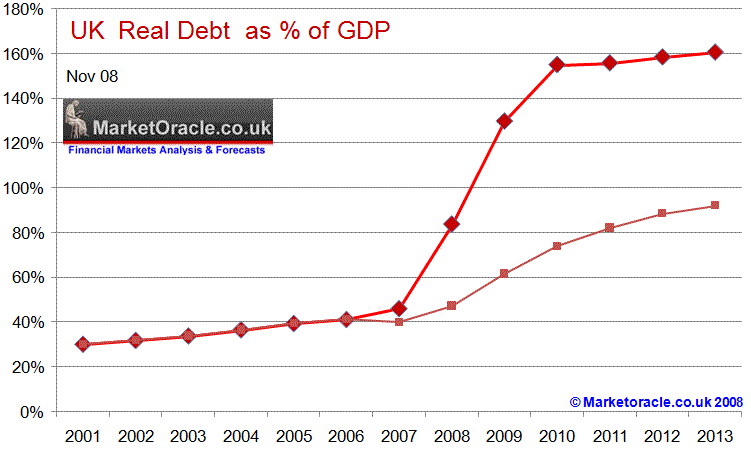We’d like to remind Forumites to please avoid political debate on the Forum.
This is to keep it a safe and useful space for MoneySaving discussions. Threads that are – or become – political in nature may be removed in line with the Forum’s rules. Thank you for your understanding.
Debate House Prices
In order to help keep the Forum a useful, safe and friendly place for our users, discussions around non MoneySaving matters are no longer permitted. This includes wider debates about general house prices, the economy and politics. As a result, we have taken the decision to keep this board permanently closed, but it remains viewable for users who may find some useful information in it. Thank you for your understanding.
📨 Have you signed up to the Forum's new Email Digest yet? Get a selection of trending threads sent straight to your inbox daily, weekly or monthly!
OECD: UK will miss start of recovery
Comments
-
All conjecture. .
Indeed just like the posters point, letting it all fall down.
I think you will find the world wide affect of this was far greater than two nations property prices.
I think most nations had some kind of property bubble.
It was a world wide crash, not two nations.
Many nations not just two will be borrowing or in debt for many years to come.0 -
What would have been the point, the outcome would have been worse and most probably even longer lasting! or is that the point?
My point is this; yes,worse and longer lasting, but we would have had firmer foundations to build on. Instead of the ones made of Jelly that Labour have left us with.
The whole point about recessions - to clear dead wood. Not to to take gutted shells of companies and support them with taxpayer cash.0 -
My point is this; yes,worse and longer lasting, but we would have had firmer foundations to build on. Instead of the ones made of Jelly that Labour have left us with.
The whole point about recessions - to clear dead wood. Not to to take gutted shells of companies and support them with taxpayer cash.
I would argue that many healthy companies would have been taken down also because of bad debt etc.0 -
Indeed just like the posters point, letting it all fall down.
I think you will find the world wide affect of this was far greater than two nations property prices.
I think most nations had some kind of property bubble.
It was a world wide crash, not two nations.
Many nations not just two will be borrowing or in debt for many years to come.
Yeah, but many of them dont have this to contend with:
When combined with this: 0
0 -
But not as serious as ours when Public and consumer debt are added together... Most germans and french dont even own a credit card....0
-
OECD: UK will miss start of recovery
So what
Just like the Tortoise and the Hare.
We might miss the start, but what about the end :rolleyes:
You can be sure that the UK will reach the end of the recovery first :eek:.......we always do :mad:'In nature, there are neither rewards nor punishments - there are Consequences.'0 -
But not as serious as ours when Public and consumer debt are added together... Most germans and french dont even own a credit card....
Can you back that up?
What do the two different lines on the graph refer to?“I could see that, if not actually disgruntled, he was far from being gruntled.” - P.G. Wodehouse0 -
Look Here:
http://www.bis.org/publ/cpss86.pdf
Germany, table 6:
Values in thousands of cards issued, figures for 2003,2004,2005,2006,2007
UK:Cards with a cash function 116,355 114,836 109,071 104,217 117,037
Cards with a debit function 90,015 88,502 88,478 89,709 94,574
Cards with a delayed debit function3 17,923 17,994 18,349 18,260 11,610
Cards with a credit function nav nav nav nav 2,564
Cards with an e-money function 62,817 63,372 63,960 65,906 73,037
of which: cards with an e-money function which
have been loaded at least once nav nav nav nav 2,355
FranceCards with a credit function2 66,825 69,888 69,858 69,520 67,311
That PDF is a pretty good indicator about how much sh*t we are in. Compare the populations and GDPs.Cards with a credit function nav nav 31,159 28,897 32,720
It has lots of other useful stats in it and figs are valid for 2007, figures released March 2009.0 -
A bit more on this.
It now appears the OECD is predicting negative growth for quarter 3, and zero growth in quarter 4.
Alistair Darling is saying they are wrong.
In an interview on BBC Radio 4's Today programme, Darling said he did not accept the OECD forecast.
"The OECD has made predictions in the past ... some have turned out not to be spot on," he said.
"My prediction in the budget was that this country would come out of recession around the turn of the year. I hold to that view."
I don't really get it, he's now saying his prediction was that the UK would come out of recession in the turn of the year (2010).... he's agreeing with the OECD, but saying he's disagreeing!?0
This discussion has been closed.
Confirm your email address to Create Threads and Reply

Categories
- All Categories
- 352.1K Banking & Borrowing
- 253.6K Reduce Debt & Boost Income
- 454.2K Spending & Discounts
- 245.1K Work, Benefits & Business
- 600.8K Mortgages, Homes & Bills
- 177.5K Life & Family
- 258.9K Travel & Transport
- 1.5M Hobbies & Leisure
- 16.1K Discuss & Feedback
- 37.6K Read-Only Boards

